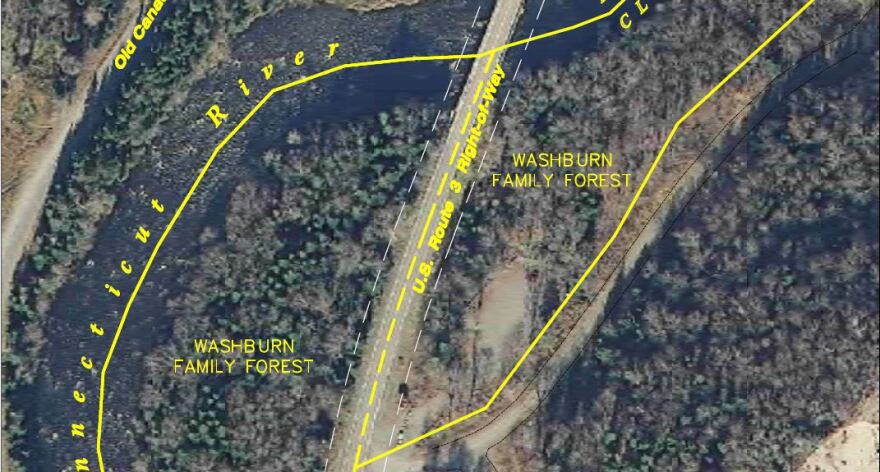The Society for the Protection of New Hampshire Forests, one of the state's oldest conservation groups, has asked the Coos County Superior Court to block the Northern Pass project, a power line which would connect New England to Canadian hydropower.
The petition claims the Forest Society owns the land under Route 3 in Clarksville where the project plans to bury the proposed line. The dispute comes down to a short section of road right where the proposed power line crosses the Connecticut River between the towns of Pittsburg and Clarksville. On either side of route 3 is a plot of land called the Washburn Family Forest, which the Forest Society owns.
“In 1931 the selectmen of Pittsburgh, Clarksville and Stewartstown jointly laid out a road which today is route 3,” explains Forest Society Vice President Will Abbot, “They paid damages to the then owner of our Washburn family forest for the taking of the right of way over that land. They did not acquire the land underlying that road, only the road itself.”
“The applicant cannot show it has the property rights it would need to build the proposed project,” says the society’s President, Jane Difley.
This is not an unexpected move. The Forest Society has been saying for two years that it would challenge the project’s right to bury the line under route 3.
Northern Pass spokesman Martin Murray says the utility has the right to use the road to move electricity, just like truckers and other private businesses use roads for private gain. “Certainly it is the right and a proper use of a public roadway to use it to convey a public good, a public commodity if you will,” he says.
In another motion submitted to the state board which reviews energy projects, the Site Evaluation Committee, the Forest Society asked regulators to rule the Northern Pass application as “incomplete”. This comes less than a week after the Department of Environmental Services said it considered the Northern Pass' application incomplete on similar grounds, and the SEC sent a letter to the Northern Pass seeking additional justification for its right to build on state roads.
However, last week the department of Transportation signaled it would accept the project's proposal of burial along roadways, writing a letter to the SEC saying it viewed the Northern Pass application as complete.

The dispute may to boil down to the question of whether Northern Pass has the same right to use roads that its parent company – Eversource Energy – has.
The Forest Society argues that because The Northern Pass will operate as a so-called “merchant facility” and sell energy into a competitive regional energy market, it doesn’t qualify as a public utility.
“It’s not something that there’s been any determination of need to go forward, it’s something simply that they want to do,” explains the Forest Society’s Vice President of communications, Jack Savage, “and from our standpoint they need our permission to have access to our land.”
However, Mark Hodgdon, an attorney for the Northern Pass specializing in highway law, says this question is “utterly irrelevant.”
“The question is: is it a proper highway use?” says Hodgdon, explaining this goes to a body of case-law called viatic use. “What allows them to be in the highway and a proper use of the highway is that they’re conveying something from point A to point B. It’s not that they’re a public utility, that’s not the magic test.”
Regardless of how the legal question is decided “what we’re looking at is the potential for a delay,” says Murray.








